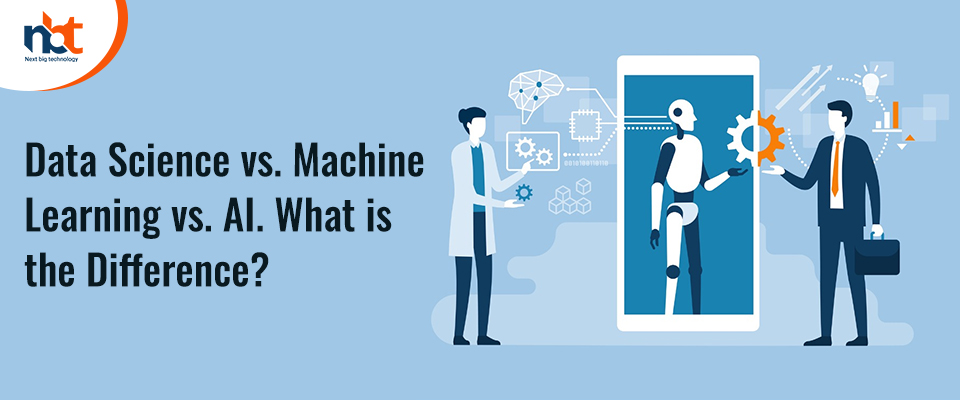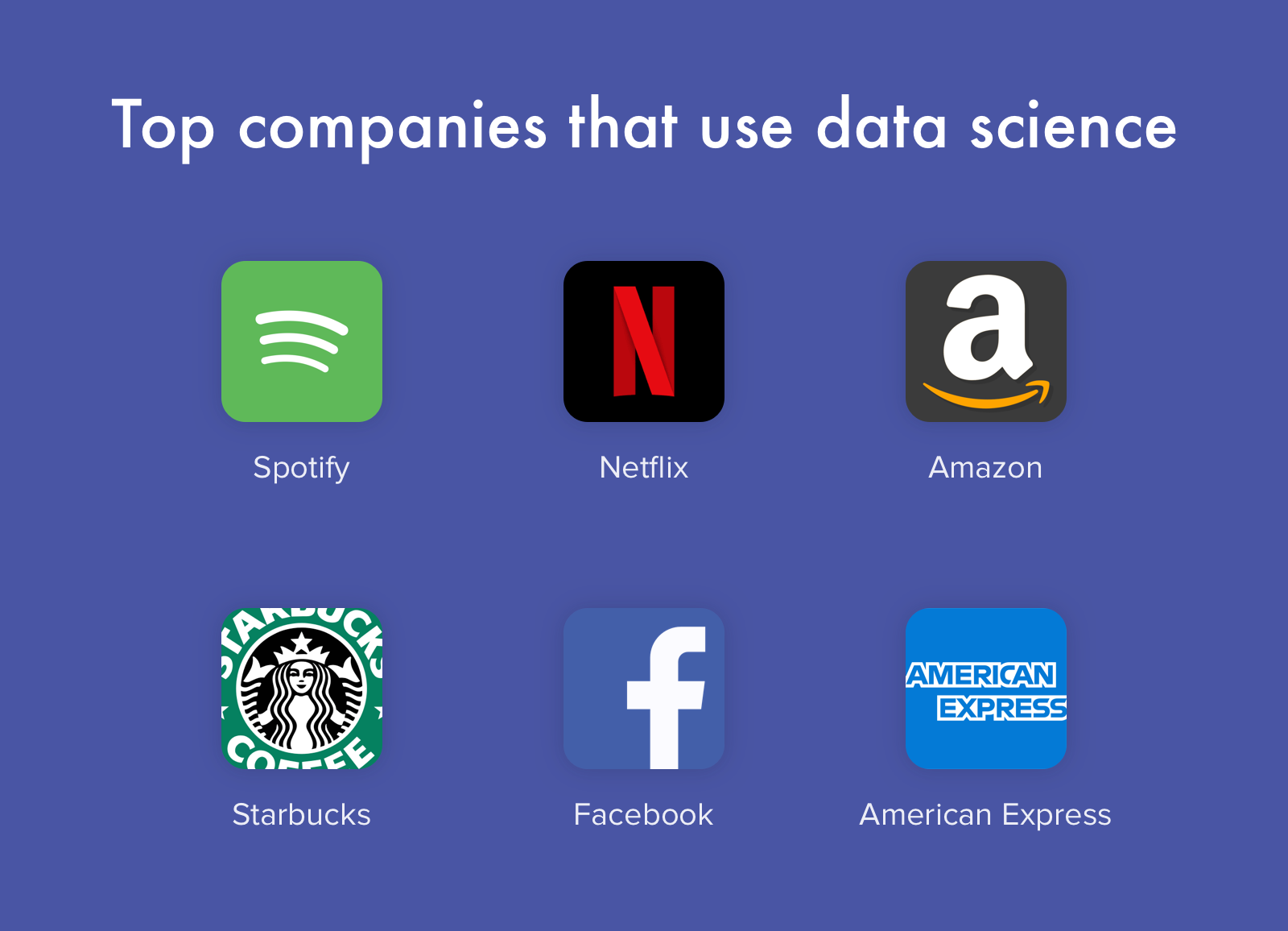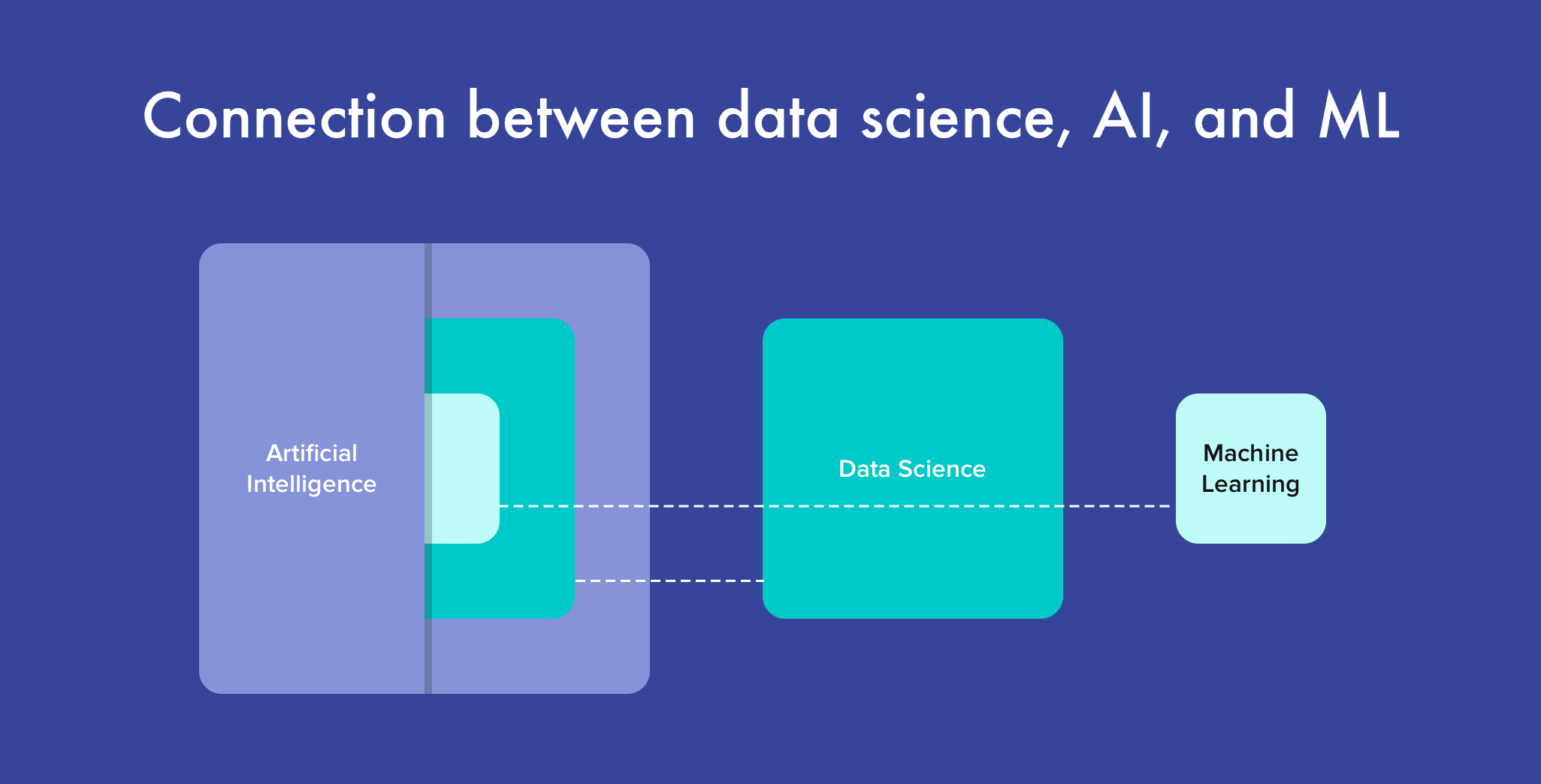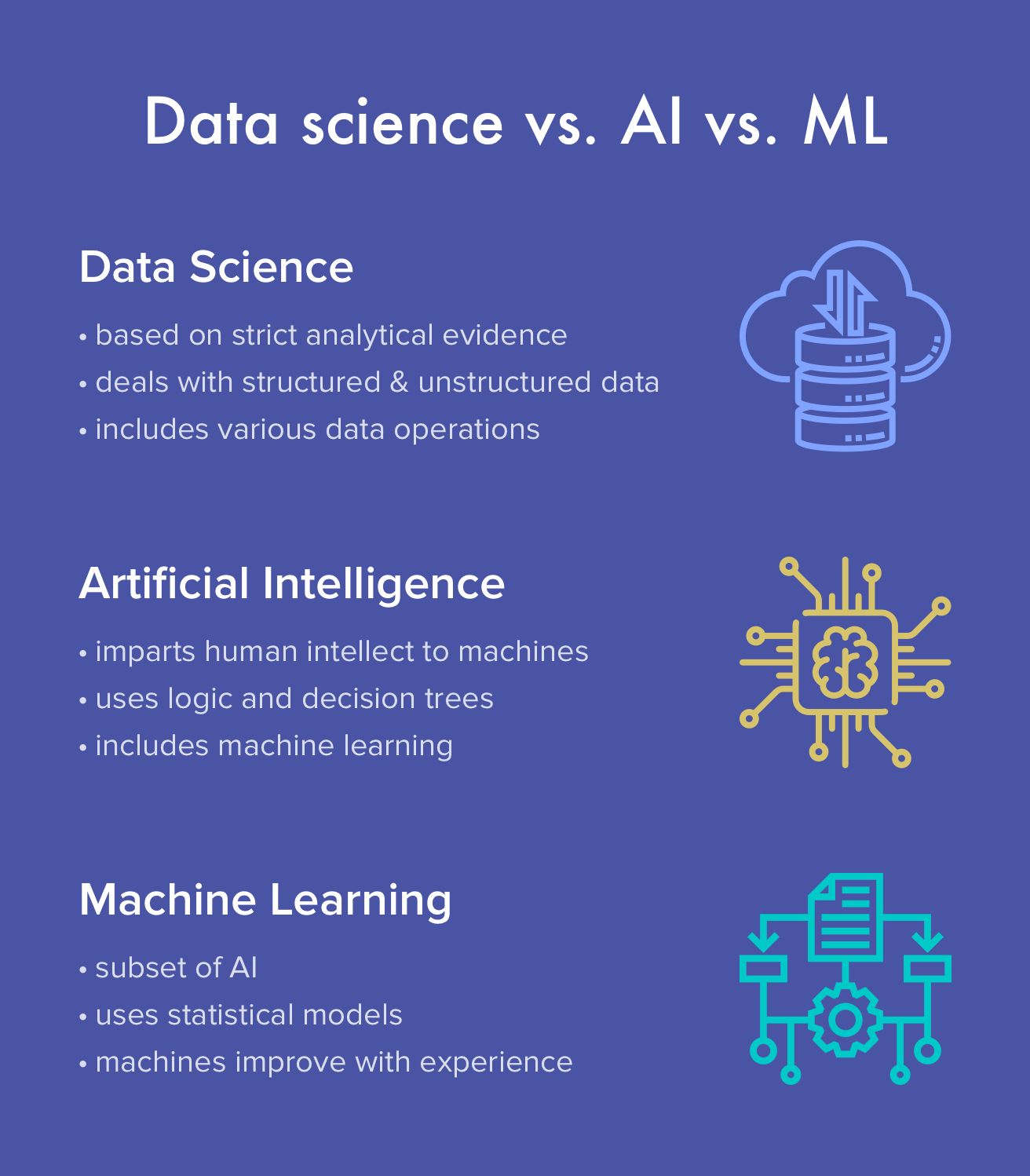Data science, machine learning, and AI have become quite popular lately. But as the popularity grows, sometimes the definition of these three technologies becomes blurry and may be used interchangeably.
To clarify what these technologies are all about, we’ll discuss each technology in detail and prove to you that they are bonded together.
First things first, let’s discover the meanings of these technologies.
Table of Contents
The Definition of Data Science
The main idea of data science is gathering brand-new results from loads of data. The larger amount of data is stored, the more crucial information and hidden patterns can be received from it. Besides, everything related to data selection, and data analysis is interconnected with data science.
Use cases of data science are pretty diverse:
- Marketing campaigns and business strategies optimization
- Forecasts and analytics creation
- In-app recommendations
- Social surveys
Let’s take Netflix, for instance. This streaming service strongly relies on its data mines to build the right content strategies and make thorough decisions about what to film next.
To fulfill proper data science integration, a data scientist is a must-have employee in the team. This profession requires these skills to fulfill all data science tasks:
- Solid understanding of SAS
- Outstanding programming skills using SQL, Python, and RapidMiner
- Good statistical analysis skills
- Strong number theory expertise
A Definition
AI stands for Artificial Intelligence, and the primary purpose of AI is to endow machines with human intelligence. In simple words, AI makes devices think like a human. AI is involved in a wide variety of apps and programs. A well-known example of good implemented AI is the voice assistant Alexa, made by Amazon. Alexa can hear human speech, analyze it, and gave correct answers. But that’s not all AI use cases:
- Various game algorithms, for example, chess supercomputer named Deep Blue
- Robot movement in robotics
- Google Maps route optimization
- Reinforcement learning
Another great example is the autopilot in Tesla cars and autopiloted robots. Amazon built a whole web of fulfillment centers where robots fulfill various goods delivered to the buyers.
To integrate AI into your workflow, hiring AI experts is a top priority for you. AI experts have a huge experience using AI frameworks like Microsoft CNTK, Amazon SageMaker NEO, Tensor Flow, Theano, and many others.
What Machine Learning Stands For?
Machine learning is closely related to Artificial Intelligence. Machine learning implies machines acting like humans, but learning happens in a slightly different way. While building AI requires writing numerous code lines, machine learning requires only algorithms and loads of data to process. An algorithm processes all this amount of data and creates logic based on it.
In a word, machines building their behavior on their own. This process helps to receive good quality results in a short timeframe. Moreover, the importance of machine learning is significant since it helps to automatize data science processes.
The most famous use case of machine learning is Netflix’s streaming service and its recommendation system. Thanks to machine learning services can analyze what movies and series customers watched recently, what genres prevail. Based on this, data algorithms can recommend other content to customers related to their interests.
In cooperation with ML, all business data will be cleaned and prepared for machine learning modeling. Moreover, one of their main tasks is transforming data insights into useful business data that can be utilized to make business decisions.
Must-have skills for machine learning experts are:
- Extensive experience using MALLET
- Apache Tomcat knowledge is a must
- Extensive experience using Python and C++
- Extensive experience using NetworkX, NLTK, Spacy, GraphLab
Data Science, ML, and AI. Distinctions and Bindings Between Them
Now, let’s discover the distinctions between all these technologies and find the places they intersect. All intersections between data science, machine learning, and AI are described in the picture below.
Data Science and Machine Learning. Intersections and Distinctions
Machine learning strongly relies on the data that algorithms work with. Meanwhile, data science is the source of these loads of data. Without data, algorithms won’t become precise, and the accuracy of their business predictions may suffer drastically. In other words, data serve as an example for further logic creation based on it.
Meantime, the distinctions between them are pretty significant. While machine learning covers a very narrow area of data processing (algorithmic, statistical, and so on), data science covers all data processing fields. To make things clear, here is an example of fields covered by data science:
- data processing (integration, visualization, engineering)
- data-driven decisions
- deployment in production mode
- distributed architecture
Distinctions Between Data Science and AI
Data science and AI’s biggest distinction is that data science strongly relies on statistical methods, meantime AI utilizes computer algorithms. Due to these reasons, data science is perfect for the creation of statistical insights, and AI aims to create models that are close to human understanding.
Artificial Intelligence and Machine Learning Distinctions
First of all, let’s cover the most noticeable distinctions between AI and machine learning:
- AI simulates human thinking.
- Machine learning utilizes methods to analyze data, learn using it, and create logic based on this data.
AI’s primary objective is to make machines think like humans, which leads to the automatization of business processes. In contrast, machine learning helps to automatize data science processes.
To unblur all distinctions, it would be wise to give examples of apps that use them in one way or another.
- Voice assistants like Aleksa, Siri, or Google Home use Artificial Intelligence to make them more human-like. They can answer the questions, give useful data (weather, traffic jams), and customers can have a meaningful conversation with them.
- Streaming services like Hulu, Tubi, Netflix utilize machine learning to create precise recommendation systems based on customer interests.
Cooperation of AI, Machine Learning, and Data Science
Let’s assume that our goal is to build a car with an autopilot system, and this autopilot must stop at stop signs. This is a perfect scenario to combine work with AI, ML, and data science.
Machine Learning
First of all, we must show our autopilot how stop signs look like so it can identify them among the other signs via built-in cameras. We gave the algorithm thousands of street signs photos to teach it to identify stop signs on these photos.
Artificial Intelligence
When car sensors identify the stop sign, the car must automatically hit the brakes and perform this action in a strict time frame.
Data Science
After a few tests, we’ve noticed that the car forgets to stop before stop signs like the car can’t recognize them. After analyzing all tests, it seems like the car misses stopsigns at nighttime and in poor light conditions. After that, we see that all photos that we feed to the machine learning algorithm took at daylight, and based on this derivation, we can make another photo database with night photos to learn the algorithm of how stop signs look at night.
Wrapping things up, that’s pretty much it. This is a perfect illustration of how machine learning, artificial intelligence, and data science combined with each other.
Author’s bio
Vitaly Kuprenko is a writer for Cleveroad. It’s a web and mobile app development company with headquarters in Ukraine. He enjoys writing about technology and digital marketing.




















